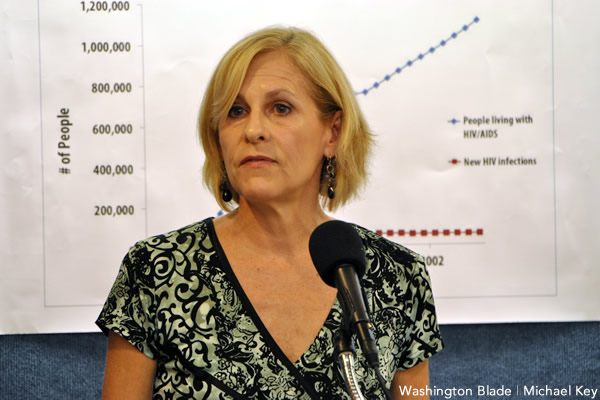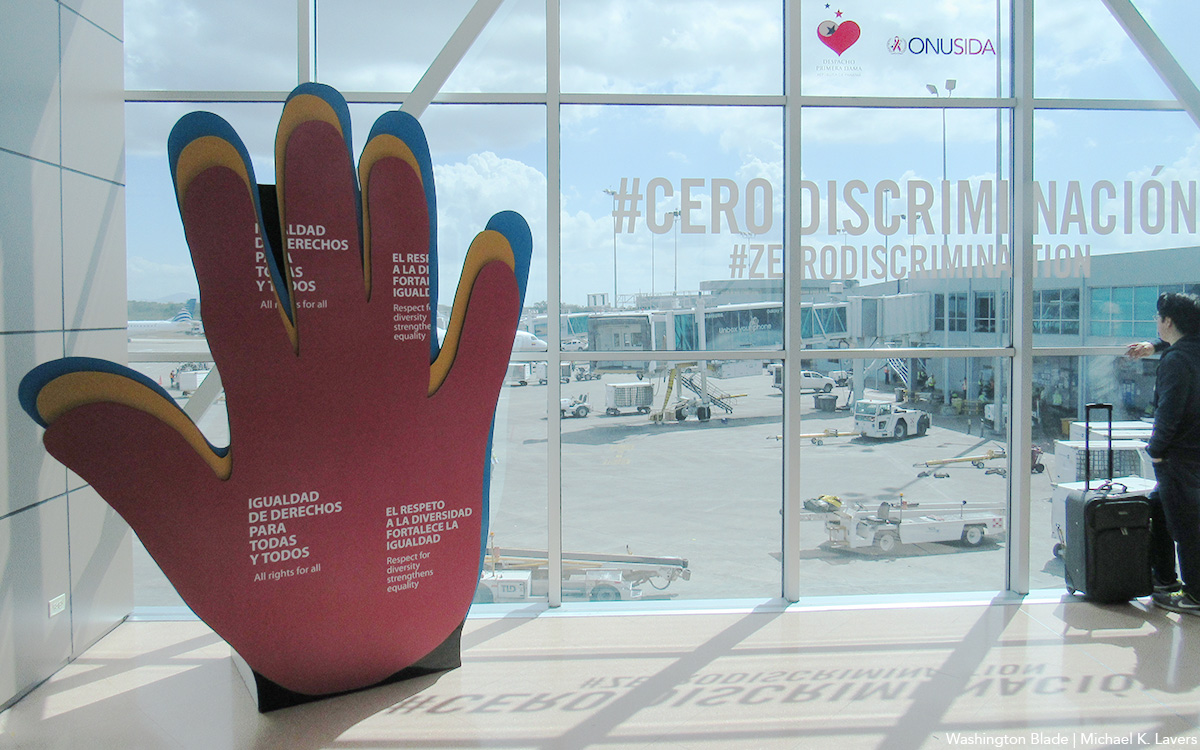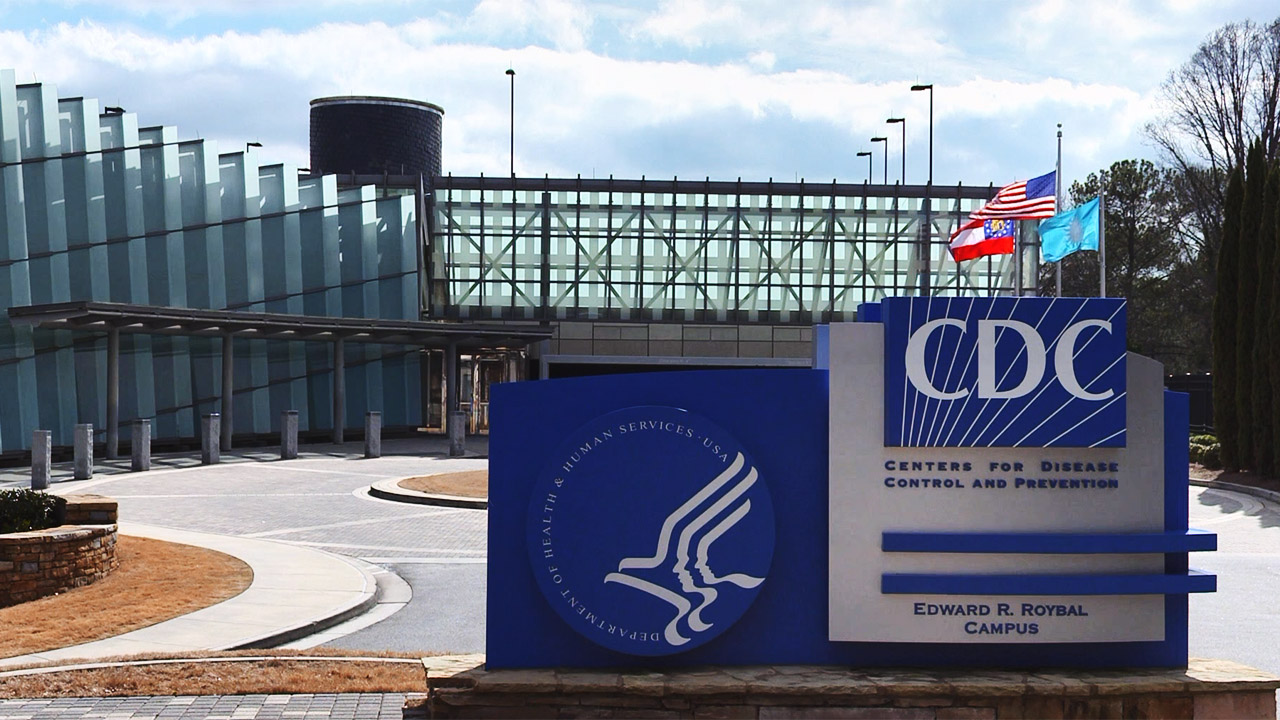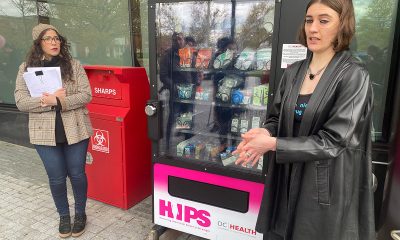Health
D.C. prepares to host Int’l AIDS Conference
Event expected to draw more than 30,000 to city from July 22-27


Julie Scofield, executive director of the National Alliance of State and Territorial AIDS Directors (Blade photo by Michael Key)
The International AIDS Conference is expected to draw more than 30,000 people from around the world to D.C. July 22-27.
Former President Bill Clinton, former first lady Laura Bush, Bill Gates of the Bill and Melinda Gates Foundation, Health and Human Services Secretary Kathleen Sebelius, U.S. Global AIDS Coordinator Eric Goosby, “The View” co-host Whoopi Goldberg and singer Elton John are among those who are scheduled to speak at the Walter E. Washington Convention Center. The White House has yet to confirm whether President Obama will attend; California Rep. Barbara Lee and Michel Sidibé, executive director of UNAIDS, are among those who are scheduled to speak at the opening session on July 22. The Gay Men’s Chorus of Washington is also slated to perform.
“We are gathering at a defining moment in the AIDS epidemic where the science tells us we can turn the tide on HIV,” said Dr. Elly Katabira, president of the International AIDS Society who serves as the conference’s international chair, and Dr. Diane Havlir of the University of California-San Francisco, who is the U.S. co-chair of AIDS 2012, in a statement that officially welcomed delegates to the nation’s capital. “Scientific advances are also propelling towards the efforts to find a cure and vaccine for HIV. AIDS 2012 will unite science, community and leadership from around the globe to develop strategies and mobilize support for translating new evidence into meaningful action that reflects HIV’s complex web of social, human rights and political issues.”
The conference — the theme of which is “Turning the Tide Together” — will feature a number of workshops and other events that will specifically discuss the epidemic’s impact among men who have sex with men and other LGBT communities. These will include networking spaces in the Global Village that will allow LGBT people and MSM to share strategies to more effectively respond to HIV and advocate on behalf of those living with the virus. “The Lancet” will also present a symposium on the epidemic’s impact among MSM on July 24.
Debbie McMillan of Transgender Health Empowerment will be among the panelists on a July 26 plenary that will examine the virus’ effects on at-risk populations. A symposium on the same day will discuss the future of HIV prevention and related health and human rights issues among gay, transgender and MSM communities.
The Blade is also an official media sponsor of the conference and will host a photo exhibit chronicling AIDS in Washington in the Global Village, which is open to the public.
A call to action
The International AIDS Society and the University of California-San Francisco on Tuesday unveiled a nine-point plan designed to further combat the global epidemic.
The “Washington, D.C., Declaration” specifically calls for an end to stigma, discrimination and human rights abuses against people with the virus and those who remain at-risk for HIV. It backs what it describes as evidence-based prevention, treatment and care that respects the human rights of “those at greatest risk and in greatest need.” The declaration further stresses the need for accelerated research on new HIV prevention initiatives, treatments and a vaccine.
UNAIDS noted in its 2010 report that an estimated 33.3 million people around the world live with HIV. The agency further reported that the number of new infections has fallen 19 percent since 1999. UNAIDS also found that 5.2 million of the estimated 15 million people with the virus in developing countries who need antiretroviral treatment receive it.
“In a scenario unthinkable just a few years ago, we now have the knowledge to begin to end AIDS in our lifetimes,” said Katabira, professor of medicine at Uganda’s Makerere University. “Yet, at this moment of extraordinary scientific progress and potential, the global response to AIDS faces crippling financial challenges that threaten past success and future progress. Through this declaration, we stand together to call on world leaders across all sectors to provide increased resources, visionary leadership and a full-fledged commitment to seize the opportunity before us.”
This year marks the first time since 1990 that the International AIDS Conference has taken place in the United States—President Obama in 2009 completed the process that lifted the ban on people with HIV from entering the country. City officials and HIV/AIDS service providers alike plan to use the biennial gathering to highlight local efforts to combat the epidemic.
D.C. Officials, HIV/AIDS groups seek presence at conference
The Department of Health’s HIV/AIDS, Hepatitis, Sexually Transmitted Disease and Tuberculosis Administration will present 15 scientific abstracts on the epidemic during the conference. The D.C. Center for AIDS Research, the body that coordinates HIV/AIDS-specific research in Washington, will highlight city-based research in a Global Village session. Mayor Vincent Gray is among those who will speak at a Memorial AIDS Quilt ceremony on July 22.
“It’s appropriate that AIDS 2012 is taking place in the District, its first return to the U.S. in 22 years, as the District has in so many ways been the face of our nation’s epidemic,” said D.C. Council member David Catania (I-At Large.) “From years of an inadequate and failed response to now, an increasingly effective and aggressive one, the District embodies the varied and diverse experience our nation has endured with the deadly disease. AIDS2012 will be a fantastic opportunity for the District to showcase its innovative prevention and treatment programs for the best and brightest in the field. The District stands as an example of what can occur when data-driven, evidence-based policies are put in place.”
Whitman-Walker Health will hold a forum on the state of the epidemic at the Lisner Auditorium, where the city’s first AIDS forum took place in 1983, on July 24. Metro Teen AIDS and Us Helping Us have also scheduled a series of events to coincide with the conference. Organizers have also organized tours of Helping Individual Prostitutes Survive, Food and Friends, La Clinica del Pueblo and other D.C. HIV/AIDS service organizations for delegates.
“We are pleased and honored to have the International AIDS Conference come to D.C.,” Dr. Ray Martins, chief medical officer at Whitman-Walker, told the Blade. “The conference gives the world a chance to learn more about the state of HIV/AIDS in the District of Columbia, but also the breadth of the response to the epidemic locally. It will allow us to highlight the tremendous efforts made by outreach workers and volunteers as well as health care providers and our elected officials.”
A number of gatherings, panels and other events will also take place throughout the city in the days leading up to the conference. These include the Gay Men’s Health Summit at George Washington University and the Global Forum on MSM and HIV on July 21, a panel on stigma in transgender and other HIV-vulnerable communities at the Human Rights Campaign on July 21 and Youth Force’s annual conference at Gallaudet University in Northeast Washington from July 17-19 and the International Network of Religious Leaders Living with or Personally Affected by HIV/AIDS’ conference at Howard University from July 17-19.
“It’s really an incredible event, so I’m glad it’s coming back here,” Ron Simmons, president of Us Helping Us, told the Blade. “With the eyes of the world focused on you, this is the time to take advantage of it.”
Calls to bolster response to domestic epidemic
HIV/AIDS activists also plan to use the conference to urge lawmakers in this country and around the world to reaffirm their commitment to ending the epidemic.
Policy makers also plan to urge Congress to adequately fund policies they say effectively combat the domestic epidemic.
“When people think of AIDS today, most probably don’t realize that AIDS is still really in a crisis mode in our country,” said Carl Schmid, deputy executive director at the AIDS Institute, during a press conference at the National Press Club in D.C. on Tuesday. He noted that 20 percent of the 1.2 million Americans with HIV today do not know their status. Schmid also pointed to roughly 50,000 new diagnoses each year. “Many, including our youth, have become complacent. With nearly 40 percent of new infections occurring in those under age 29 and with more HIV in our country than ever before, it is imperative that we raise our country’s consciousness.”
President Obama in 2010 unveiled a National HIV/AIDS Strategy that seeks to reduce rates of HIV and HIV-related health disparities and increase access to care for people with the virus.
Julie Scofield, executive director of the National Alliance of State and Territorial AIDS Directors, applauded the Obama administration for what she described during the National Press Club press conference as its ongoing commitment to fight the domestic epidemic. She stressed, however, that federal funding has not kept pace with the needs of those with HIV.
“It has always been important to acknowledge from the very beginning of this fight that the goals of the strategy cannot be achieved without significant increases in funding for critical domestic HIV/AIDS discretionary programs,” said Scofield.
Health
UNAIDS to commemorate Zero Discrimination Day’s 10th anniversary
UN agency urges global action to protect human rights

As the world marks the 10th anniversary of Zero Discrimination Day; UNAIDS is sounding the alarm on the increasing threats to human rights, calling for renewed efforts to protect the rights of all individuals as a fundamental step towards ensuring health for everyone.
Established by UNAIDS a decade ago, Zero Discrimination Day aims to promote equality and fairness regardless of gender, age, sexuality, ethnicity or HIV status. The progress achieved over the past years is now in jeopardy, however, due to rising attacks on the rights of women, LGBTQ people and other marginalized communities.
UNAIDS Executive Director Winnie Byanyima emphasized the critical link between protecting human rights and safeguarding public health.
“The attacks on rights are a threat to freedom and democracy and are harmful to health,” she said in a press release. “Stigma and discrimination obstruct HIV prevention, testing, treatment and care and hold back progress towards ending AIDS by 2030. It is only by protecting everyone’s rights that we can protect everyone’s health.”
Despite challenges, there has been notable progress.
At the onset of the AIDS pandemic more than 40 years ago, two-thirds of countries criminalized consensual same-sex sexual relations. They are now decriminalized in two-thirds of countries. An additional 38 countries around the world have pledged to end HIV-related stigma and discrimination, contributing to positive changes that include 50 million more girls attending school compared to 2015.
To sustain and enhance these advancements; UNAIDS urges global support for women’s rights movements, LGBTQ rights, racial justice, economic justice, climate justice and peace initiatives. By standing with communities advocating for their rights, the U.N. aims to reinforce the collective effort towards a more inclusive and equitable world.
Zero Discrimination Day is observed on March 1.
Events and activities that will take place around the world throughout the month will serve as reminders of the essential lesson and call to action: Protecting everyone’s health is synonymous with protecting everyone’s rights.
“Through upholding rights for all, we will be able to achieve the Sustainable Development Goals and secure a safer, fairer, kinder and happier world — for everyone,” said Byanyima.
Health
New CDC report finds transgender women at higher risk for HIV
More than 1,600 people in seven cities surveyed

The Centers for Disease Control and Prevention issued a new study report this week that revealed that restricted by employment and housing discrimination and lack of access to needed gender-affirming healthcare for transgender women increasing the risk of contracting HIV.
Researchers reviewed data from a 2019-2020 survey, the National HIV Behavioral Surveillance Among Transgender Women, which found that the demographics of HIV/AIDS have been disproportionally high, especially among Black and Latina trans women, who had experienced employment and housing discrimination coupled with lack of access to gender-affirming healthcare.
The Jan. 25 Morbidity and Mortality Weekly Report was based on data studies of more than 1,600 trans women in seven major urban locales. Participants from Atlanta, Los Angeles, New Orleans, New York, Philadelphia, San Francisco and Seattle were chosen by referrals from people and community-based organizations who knew or were part of the local population of trans women.
The study’s researchers noted: “Employment discrimination occurs at the overlapping nexus of poverty, homelessness, incarceration, health insurance, disability, food insecurity and survival sex work. These issues are interconnected.”
The study stated that trans women’s inability to access quality healthcare, including gender-affirming treatment or access to PrEP, and can expose them to potential incarceration as many turn to “survival sex work” and violence, which increases the risk of contracting HIV.
The study’s author’s pointed out: “When economically marginalized transgender women are refused employment, this refusal cyclically contributes to economic hardships. This analysis …demonstrates the importance of transgender women working and living with dignity and without fear of unfair treatment.”
Health
A Whole New Perspective on Well-Being
The Mather’s team recognizes that everyone’s wellness journey is completely unique to their life experiences and influences.

It’s easy to spot the distinctive, elegant silhouette of The Mather, a Life Plan Community for those 62+ opening this spring in Tysons, Virginia. What is not apparent to the naked eye is The Mather’s unique wellness philosophy, which is literally built into the community.
The Mather’s team recognizes that everyone’s wellness journey is completely unique to their life experiences and influences.
Nature is one of the important factors that contribute to well-being. So The Mather is incorporating biophilic design—a design approach to facilitate access to nature or things that replicate natural patterns. This can include interior spaces with sightlines to a garden, choosing natural wood and stone as interior materials, or incorporating fragrant flowers and plants indoors to spark memories and provide tactile opportunities such as gardening.

“Providing biophilic design within interior settings connects residents to the natural world,” says Mary Leary, CEO and President of Mather, the organization behind The Mather. “Research shows that a connection to nature provides positive benefits to mental states and overall well-being. At The Mather, biophilic design is the intersection of buildings and programs with nature in an urban setting.”
“The Mather is attracting a diverse group of older adults,” says Mary. “As a result, we aim to incorporate wellness practices from around the world, including Wyda movement theory of the Celtic Druids, which helps people achieve harmony with nature and contentment through mindfulness.” This holistic regenerative approach is similar to Qi Gong and yoga, while born in a different part of the world. Mather Institute has a special focus on mindfulness to support older adults’ practice of present moment awareness, which can lead to increased overall well-being, compassion, and joy.
A very different example of a wellness offering at The Mather is the Gharieni Welnamis spa wave bed, which uses computer-controlled vibrational therapy and audio frequencies to train the brain to relax. “The bed increases mindfulness, concentration, and creativity—all of which support our mission of creating Ways to Age Well,SM” says Mary.
These and other personalized ways to wellness will ensure that residents of The Mather can choose from seemingly countless ways to focus on their well-being. In other words, the sky’s the limit!




















